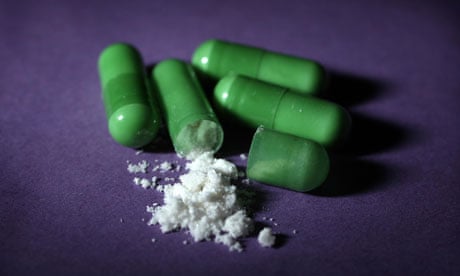The UK's "outdated" drug laws could be doing more harm than good and are failing to recognise that banning some "legal highs" may have negative consequences for public health, according to the leading independent panel set up to analyse drugs policy.
On the eve of the 40th anniversary of the Misuse of Drugs Act, the UK Drug Policy Commission warns that the exponential rise in "legal highs" and the availability of substances over the internet is making current laws redundant.
A damning report carried out for the commission by thinktank Demos suggests that drug control legislation is no longer "fit for purpose" in the 21st century and should be replaced using consumer protection legislation.
In the longer term, the report suggests, the government should introduce a harmful substances control act that would change how all psychoactive substances, including alcohol and tobacco, are controlled.
"Forty years ago, the Misuse of Drugs Act was passed in a world where new drugs came along every few years, not every few weeks," said Roger Howard, the chief executive of the commission. "The argument about whether to be tough or soft about drugs is increasingly redundant in the era of the internet and global trade; we have to think differently." The 149-page report, which has been welcomed by senior police officers, will be seen as a stern corrective to successive governments' thinking on drug control, which has heavily favoured prohibition. The coalition government has been reluctant to contemplate a radical shift in drugs policy, preferring a plan to subject new substances to temporary bans as and when they come to market.
The report, Taking Drugs Seriously, suggests that the government and its advisers assess the potential benefits, as well as harmful effects, associated with some legal highs and recognises that their use could prevent people experimenting with more dangerous drugs.
It points to research into drug tests on soldiers in the British army that showed that cocaine use fell by more than half between 2008 and 2009, when mephedrone or "meow meow" – a new legal high outlawed in 2010 – was becoming increasingly available.
Significantly, official data reveals that between 2008 and the first six months of 2009, cocaine-related deaths among the population as a whole fell 28%.
"The Misuse of Drugs Act has passed its sell-by date," said Jonathan Birdwell, the report's co-author. "So-called 'legal highs' present an entirely new challenge that needs a more intelligent response. With the aim of being hardline towards all psychoactive substances, the government risks making it more, not less, dangerous for young people who want to experiment."
There are now more than 600 substances controlled under the Misuse of Drugs Act in the UK and the number looks set to increase. According to data presented to the Independent Scientific Committee on Drugs, an unprecedented 40 new substances were produced in the far east and sold in the UK in 2010.
To combat the trend, the report suggests that the government consider controlling the supply of new psychoactive drugs through existing consumer protection legislation, rather than relying on regulations that appear to have little credibility in the eyes of young people.
Legislation would limit the number of vendors who can supply controlled substances and compel them to demonstrate that their products meet certain standards or sell them with information on dosage levels and side effects. Civil and criminal sanctions could be brought against those who break the law.
"It might be time to say that those who seek to sell new substances should have to prove their safety, rather than that the government should have to prove otherwise," Howard said. "Controlling new substances through trading standards legislation offers a new vehicle to achieve this."
The report has been cautiously welcomed by police at a time when their budget is under strain. "Police forces and health professionals across England and Wales are only too aware of the problems that a wave of new drugs can bring," said Tim Hollis, the chief constable of Humberside police and the national lead on drugs for the Association of Chief Police Officers. "The idea of trading standards officers having a stronger role in controlling substances is one that is worthy of consideration."

Comments (…)
Sign in or create your Guardian account to join the discussion